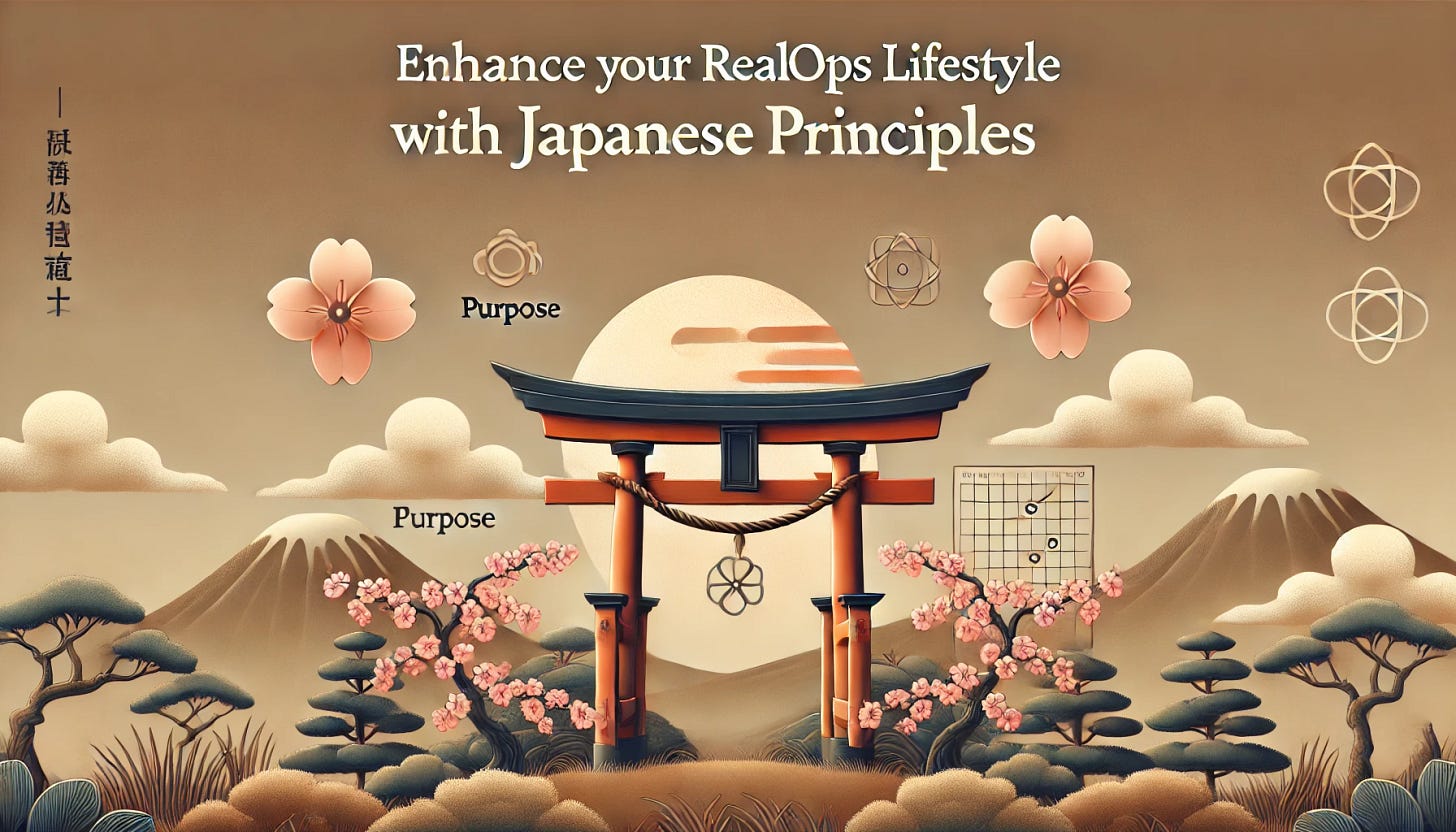8 Japanese Principles for DevOps Professionals
Embrace purpose, resilience, and continuous improvement on your journey as a RealOps Devops Engineer.
In the demanding world of DevOps, where rapid innovation meets high expectations, it's easy to feel overwhelmed or burnt out. The RealOps Lifestyle Framework was created to empower DevOps professionals not only to excel in their careers but also to cultivate a fulfilling, balanced life. By integrating Japanese philosophies like Ikigai (purpose), Kaizen (continuous improvement), Shoshin(Beginner’s Mind) and more, we can foster a mindset that supports both career success and personal well-being. Here’s how eight timeless Japanese principles can help you thrive as a RealOps Engineer and enrich your journey.
1. Ikigai (Purpose)
Literal Meaning: Ikigai means “a reason for being.” It combines four elements: what you love, what you’re good at, what the world needs, and what you can be paid for.
RealOps Lifestyle Alignment: Finding your Ikigai means aligning your work with a deeper purpose. Reflect on what drives you in DevOps. Is it the satisfaction of solving complex problems, building robust systems, or empowering innovation? When your work aligns with your purpose, you stay energized, resilient, and less likely to experience burnout. This principle encourages you to view your DevOps career as more than just a job—it’s part of a purposeful, fulfilling life.
2. Kaizen (Continuous Improvement)
Literal Meaning: Kaizen translates to “change for the better” or “continuous improvement,” focusing on small, steady steps that lead to long-term progress.
RealOps Lifestyle Alignment: Embracing Kaizen means taking a growth-oriented approach to both professional skills and personal development. In DevOps, this could mean refining your coding skills, optimizing workflows, or adopting new tools one step at a time. Beyond work, Kaizen encourages RealOps Engineers to incorporate small, positive habits for mental clarity, physical health, and emotional resilience. By focusing on incremental improvement, you build a solid foundation for sustained growth.
3. Shoshin (Beginner’s Mind)
Literal Meaning: Shoshin, from Zen Buddhism, means “beginner’s mind,” representing an attitude of openness and eagerness, no matter how advanced you are.
RealOps Lifestyle Alignment: Adopting a beginner’s mind is vital in DevOps, where new tools, practices, and methodologies emerge constantly. Shoshin helps you stay adaptable, creative, and open to new learning experiences. This mindset fosters innovation and flexibility, essential traits for thriving in a dynamic field. Embracing Shoshin in life can also help you enjoy new experiences and grow beyond your comfort zone, enriching both personal and professional development.
4. Hara Hachi Bu (Moderation)
Literal Meaning: Hara Hachi Bu is the Japanese practice of eating until you’re 80% full, promoting moderation to avoid excess.
RealOps Lifestyle Alignment: This principle reminds RealOps Engineers to avoid overloading themselves. In a field that often demands long hours and high focus, moderation ensures long-term performance and prevents burnout. Balance intense work periods with rest and recharge activities, like exercise or a hobby. Moderation supports the RealOps Lifestyle by helping you sustain productivity and health over the long haul.
5. Shinrin-Yoku (Nature Therapy)
Literal Meaning: Shinrin-Yoku, or “forest bathing,” means immersing oneself in nature to rejuvenate the mind and body.
RealOps Lifestyle Alignment: Nature therapy is a powerful tool for mental reset, especially after challenging days or intense project deadlines. Shinrin-Yoku encourages you to disconnect from screens and immerse yourself in natural surroundings, which can improve creativity, reduce stress, and increase focus. Incorporating time in nature aligns with the RealOps Lifestyle by supporting mental clarity, resilience, and balance, ensuring you come back to work refreshed and focused.
6. Wabi-Sabi (Embracing Imperfection)
Literal Meaning: Wabi-Sabi is a philosophy that encourages us to accept and appreciate imperfection, simplicity, and transience.
RealOps Lifestyle Alignment: In DevOps, where systems are complex and failures inevitable, Wabi-Sabi teaches RealOps Engineers to embrace imperfections as part of the learning process. Instead of stressing over minor flaws, focus on resilience and growth. Wabi-Sabi allows you to accept that life and work won’t always be perfect, which fosters patience and adaptability. This mindset strengthens your resilience in facing challenges and enhances overall well-being.
7. Ganbaru (Persistence)
Literal Meaning: Ganbaru means “to do one’s best” with persistence and commitment, especially in the face of difficulties.
RealOps Lifestyle Alignment: Ganbaru embodies the resilience needed for RealOps Engineers. Whether you’re debugging a complex issue or tackling a high-stakes project, Ganbaru reminds you to stay dedicated, pushing through obstacles. This persistence not only drives career success but also reinforces personal growth and self-discipline, creating a strong foundation for a balanced life.
8. Gaman (Endurance)
Literal Meaning: Gaman translates to “enduring the seemingly unbearable with patience and dignity.” It’s about maintaining composure and resilience during tough times.
RealOps Lifestyle Alignment: Gaman is invaluable when handling high-pressure situations, such as production incidents or urgent deadlines. Practicing Gaman helps RealOps Engineers stay calm, focused, and resourceful under stress. This endurance extends beyond work, helping you handle personal setbacks with patience and grace. Gaman embodies the RealOps Lifestyle’s commitment to resilience, supporting both your professional effectiveness and personal well-being.
Embrace Your RealOps Journey
The RealOps Lifestyle Framework goes beyond technical mastery; it supports a holistic, balanced approach to your career and life. These Japanese principles offer more than just techniques—they offer a path to harmony, resilience, and purpose. By integrating Ikigai, Kaizen, Shoshin, and other timeless practices into your RealOps journey, you’ll be better equipped to handle the challenges of DevOps while building a fulfilling, sustainable career and lifestyle.
Let’s Continue the Conversation!
What principles resonate most with you? Which one do you plan to implement in your RealOps journey? Join the discussion in the comments, and share your experiences with the RealOps community!
If you found value in these insights, consider sharing this post with fellow DevOps professionals who might also benefit from a holistic approach to their career. And if you’re interested in diving deeper into the RealOps Lifestyle, sign up for our newsletter to receive regular tips, resources, and community updates.
#RealOpsLifestyle #DevOps #HolisticGrowth #JapanesePrinciples
Thank you for being part of this journey toward a more balanced and purposeful life in DevOps.




